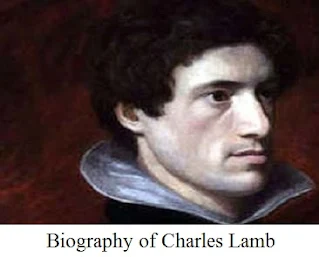Biography of Charles Lamb:
Charles Lamb (10 February 1775 – 27 December 1834) was an English essayist, poet, and antiquarian. He is best known for his essays under the pseudonym Elia, published in London Magazine in the early 19th century.
Here's an overview of his life and contributions:
Early Life and Education:
Birth: Charles Lamb was born in London, England.
Family Tragedy: Lamb had a difficult family life. His sister, Mary Lamb, struggled with mental health issues and killed their mother in a fit of madness. Mary was declared insane and spent some years in an asylum.
 |
| Biography of Charles Lamb |
Lamb's Professional Career:
Work: Lamb worked as a clerk at the East India Company for most of his life. Despite his unremarkable day job, he gained recognition as a writer and was a prominent figure in the London literary scene.
Essays: Lamb's essays, published in the London Magazine as "Essays of Elia," were highly regarded for their wit, charm, and personal reflections on various subjects, including life in London, literature, and social issues.
Literary Contributions:
Poetry: Lamb also wrote poetry, though he is primarily celebrated for his essays. He collaborated with his sister, Mary, on a book titled "Poetry for Children."
Shakespeare: Lamb's enthusiasm for William Shakespeare led him to write "Tales from Shakespeare" (1807), a collection of simplified versions of Shakespeare's plays for children, co-authored with his sister.
Personal Life and Later Years:
Marriage: Lamb remained unmarried throughout his life and lived with his sister Mary.
Legacy: Lamb's essays are considered classics of the English essay tradition. His writing style, characterized by a blend of humor, nostalgia, and profound insights, endeared him to readers.
Deathof Charles Lamb:
Passing: Charles Lamb died on 27 December 1834 in Edmonton, London.
Charles Lamb's essays, noted for their humane and compassionate outlook on life, have continued to captivate readers over the centuries. His ability to find beauty and wisdom in ordinary experiences made his work timeless, ensuring his place in the literary pantheon of English essayists.